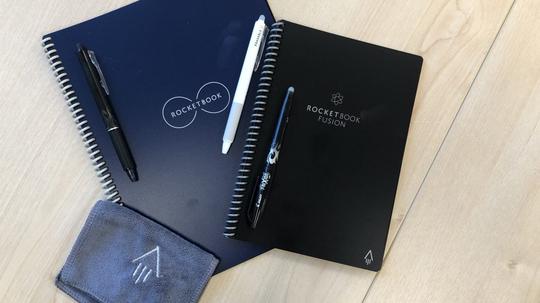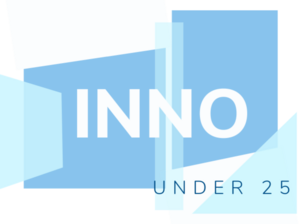
More than four years after the Indiegogo campaign that first launched the cloud-integrated notebook, Rocketbook is soaring.
On Amazon Prime Day—this year, it was July 15—the Boston-based startup partnered with the e-commerce behemoth to launch the Rocketbook Fusion notebook, which premiered as a Prime Day exclusive. Amazon, Rocketbook's founders told me, approached them. (That's a far cry from Rocketbook's delivery woes back in February 2016, when an explosion in popularity online led to a backlog of orders.)
It seems to be all smooth sailing for Rocketbook. I caught up with founders Joe Lemay and Jake Epstein over the phone recently. These days, they estimate about half of all Rocketbook customers are corporate professionals. Boston Scientific was one of the first companies to place a business order in September 2015. Since then, General Electric, Stripe, Facebook, Airbnb, HubSpot, Microsoft and Google have all hopped on the ship.
Appropriately, even NASA has bought Rocketbooks for its employees.
"They don't want to just buy ordinary notebooks and pack their shelves," said Lemay. "They want to buy and have their employees use notebooks of the future that are sustainable, digitizable and really deliver on ushering in the future of handwriting as they usher in the future of their digital businesses."
We at BostInno tried out the Rocketbook, too: the Fusion and Everlast. Check out the video below.
https://youtu.be/GclEftFOV8Y
Today, Rocketbook counts about 30 employees on its staff and works out of an office near North Station in Boston. Rather than outside investment, its funding comes largely from the sales of its product. Lemay and Epstein went on Shark Tank in 2017 to pitch the futuristic notebook but were rejected.
I asked the founders if they planned to take the company public at any point.
"Absolutely," Lemay said, but his co-founder quickly added that there's really no urgency.
"Right now, we're focused on launching as many useful and awesome products [as possible] and getting them in users' hands and having a ton of fun doing it," Epstein said. "We just aren't focused on an exit strategy."
Instead, Rocketbook is focused on a new product: smart whiteboards. In fact, the pursuit is a bit of a throwback for Lemay, who co-founded Rocketboard, an app that lets you share your whiteboard sessions in real time over the Web. The idea is essentially to take the premise of the Rocketbook and blow it up, plus—like Rocketboard—allow people to use the board collaboratively.
"There's many millions of existing whiteboards out there, and nobody wants to buy a $1,000 or $2,000 piece of equipment to replace," Lemay said. "Picture your existing whiteboard, but by putting a beacon in each of the four corners, this essentially turns your ordinary whiteboard into one of the future, with digital capabilities, that behaves a lot like a Rocketbook page and stores your notes for you. We also have something called Snapcast Mode: as you take a picture of your whiteboard, it's automatically updated for people who want to follow along with you."
Notably, that idea is similar to Think Board, a startup launched out of Babson College in 2014.
Lemay and Epstein estimate that about 40 percent of their customer base is made up of teachers and students. That would put a smart whiteboard right in their wheelhouse.
"We're disrupting the $5 billion smartboard market with $14 beacons," Lemay said.








